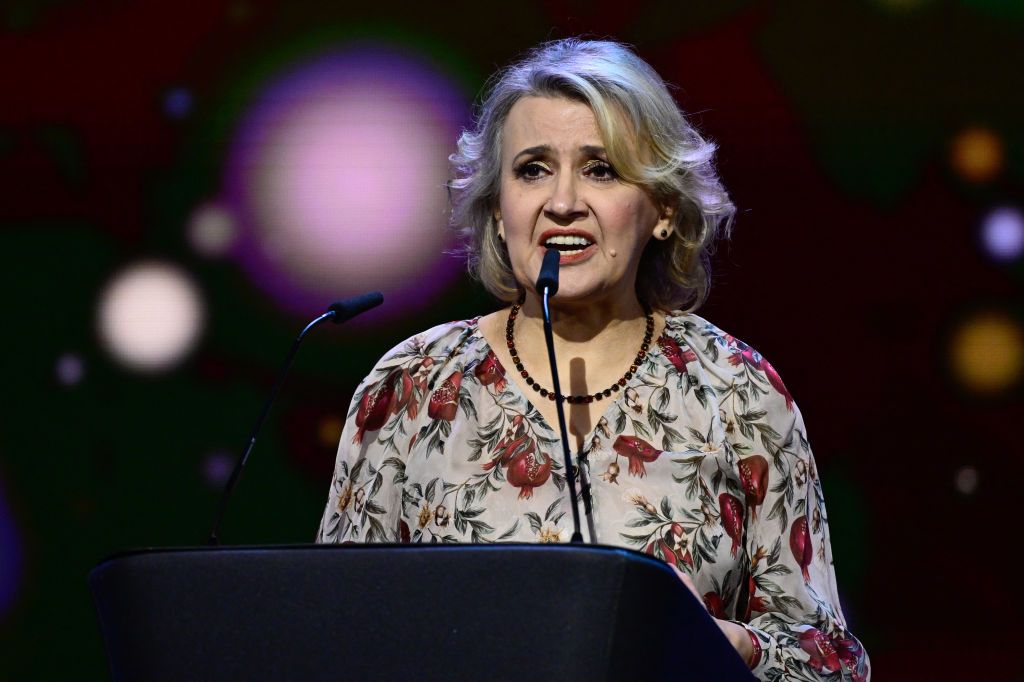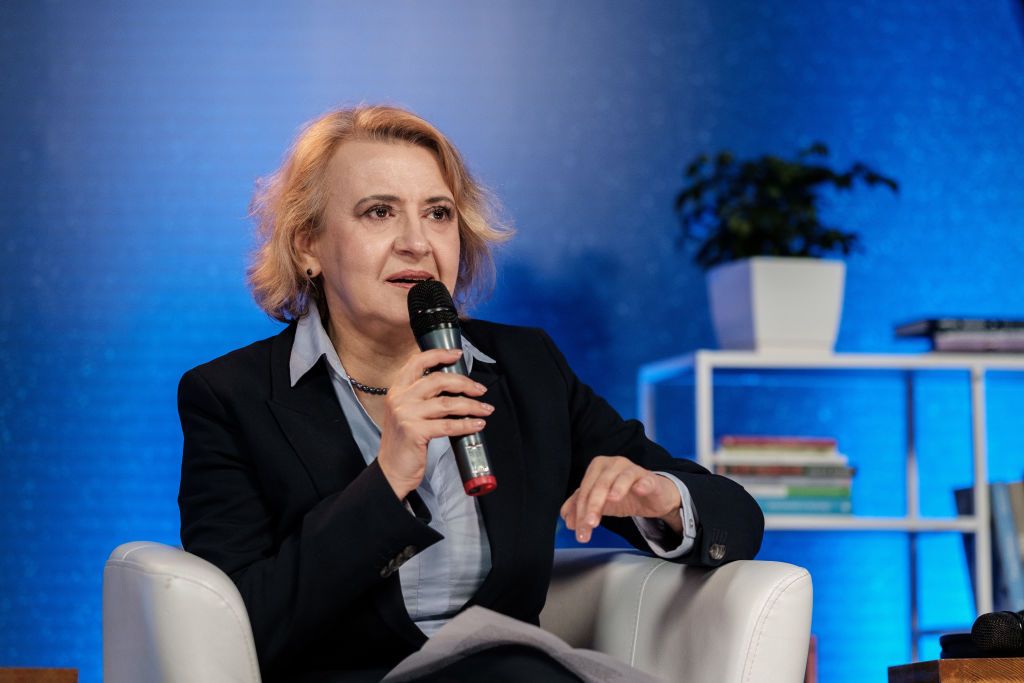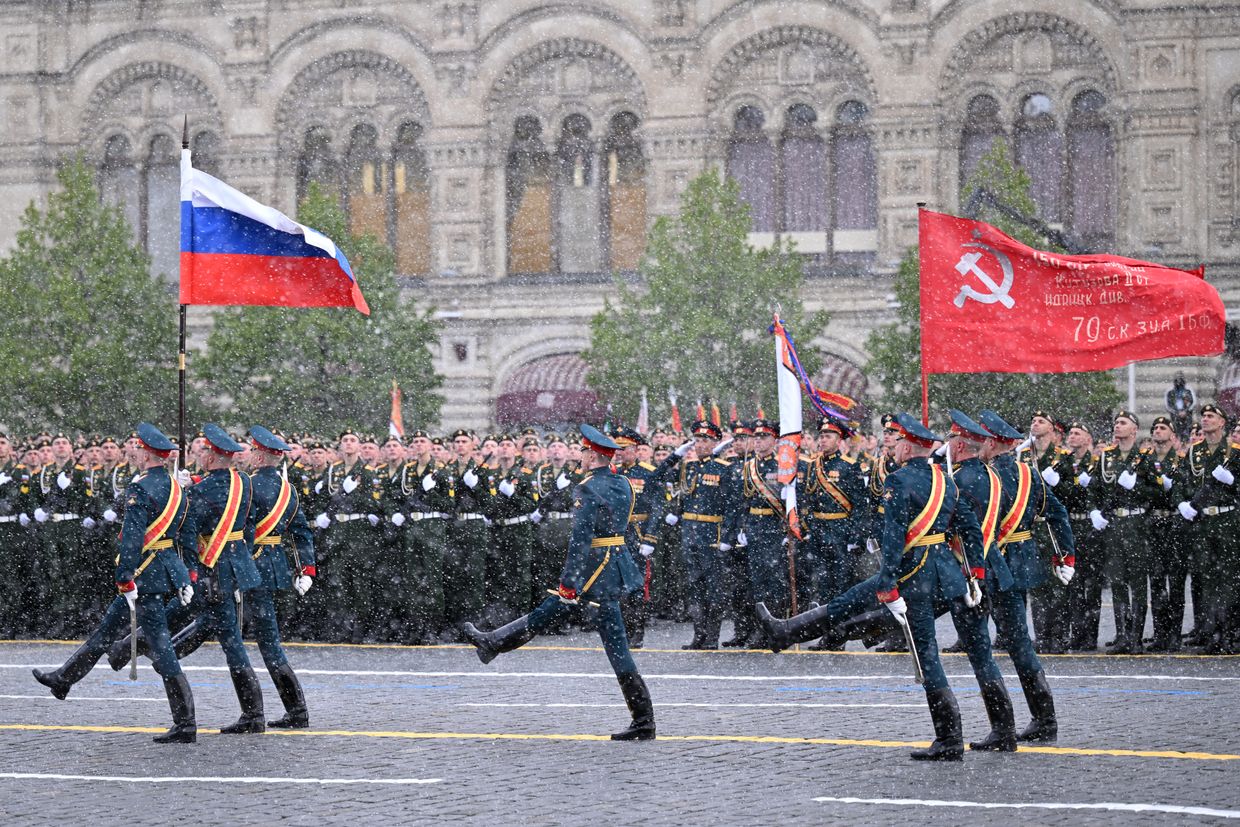
Over the previous three years of full-scale warfare, Ukraine’s cultural figures have shifted from focusing solely on their craft to turning into diplomats, advocating for his or her tradition overseas because the Russian military continues its relentless try and destroy it.
On the identical time, inside Ukraine itself, a resurgence of nationwide id that started in 2014 has been accelerated by the full-scale warfare. Ukrainians en masse are reclaiming and reconnecting with their heritage, immersing themselves in a tradition that Russia has spent centuries attempting to suppress.
Oksana Zabuzhko, one among Ukraine’s most distinguished authors, has been on the forefront of the nation’s cultural revival since its independence in 1991. Her novel “Fieldwork in Ukrainian Intercourse” is thought to be some of the vital works of impartial Ukraine and her books have been translated into a number of overseas languages.
In an interview with the Kyiv Unbiased, Zabuzhko mentioned why Ukrainians mustn’t really feel obligated to respect Russian literature, the rightful place of traditional Ukrainian feminine authors within the world literary canon, the problem of self-censorship throughout wartime, and why it’s improper to share a stage with Russian authors whereas the warfare continues.
This interview has been edited for size and readability.
The Kyiv Unbiased: Throughout the previous three years of the full-scale warfare we’ve seen an rising quantity of worldwide consideration directed at Ukraine and Ukrainian tradition. However what does the West nonetheless not perceive about Ukraine?
Oksana Zabuzhko: Properly, I wouldn’t place all of the blame on the West. A major share of it does lie there, however I don’t see it as my position to behave like some type of world instructor. Truthfully, I hate that position, regardless that I usually discover myself having to play it.
There are nonetheless many issues about Ukraine that Ukrainians themselves have but to completely perceive. We’re nonetheless within the technique of self-discovery — studying about our personal historical past, and id. Proper now could be a very fascinating time, with this main tectonic shift taking place. For the primary time since 1945, Europe is being compelled to confront its safety system by itself. In a approach, (U.S. President Donald) Trump and his administration served as a wake-up name for Europe, and instantly, we’re seeing all these fascinating discussions — each Ukrainian and worldwide — happening in Kyiv.
For years, Ukraine was seen as an axis between East and West — between Poland and Russia — interpreted by frameworks like Samuel Huntington’s “conflict of civilizations” or different related narratives, which, frankly, I contemplate nonsense. However now, we’re witnessing a shift: Ukraine is turning into an axis that runs North-South. I name this challenge “Mazepa’s Europe,” after (Ukrainian) Hetman (Ivan) Mazepa, who as soon as envisioned it. His imaginative and prescient in the end failed within the early 18th century, nevertheless it was rooted in an older, traditionally vital route — the trail from the Varangians to the Greeks, which has lengthy performed an important position in each Ukrainian and European historical past.
This concept of an "Intermarium" — linking the Baltic and Black Seas — isn’t a hierarchical mannequin the place nice powers dictate phrases to smaller nations. As an alternative, it’s a democratic Intermarium, the place states and nations collaborate as equals, forming short-term alliances and dealing collectively on their very own phrases. It stands in stark distinction to the outdated mannequin of energy, the place selections about smaller nations’ fates have been revamped their heads by the so-called nice powers — like in Yalta (in 1945).
It’s a unique method — very European, I’d say. It’s deeply anti-superpower, anti-imperial, and on the identical time, unmistakably Ukrainian. In spite of everything, we now have at all times existed alongside this historic route from the Varangians to the Greeks.
Mazepa’s challenge is one thing generations of Ukrainians have been by no means taught at school. Our closely Russified, colonial training system conditioned individuals to consider that Mazepa was a villain just because he defied Peter I. (Russian poet Alexander) Pushkin wrote that he was a traitor, and so we have been taught to respect Pushkin. However we don’t should.
That is a part of the broader decolonization course of — studying about ourselves from a long-term perspective, whether or not throughout three centuries or perhaps a millennium. There’s nonetheless a lot we now have but to share with the world, and lots of new textbooks are nonetheless ready to be written. It’s an thrilling topic.

The Kyiv Unbiased: Constructing on this concept, I’ve to say that I not too long ago learn Olha Kobylianska’s brief story “Valse mélancolique” (1898) for the primary time, and as a foreigner, I used to be struck by the sturdy custom of feminist thought in Ukrainian literature. The road, “We will dwell not as moms or wives, however as girls,” has stayed with me ever since. It appears to me that if the world have been extra accustomed to Ukraine’s traditional feminine writers, they’d rightfully earn their place within the world literary canon.
Oksana Zabuzhko: Thanks a lot — I can’t inform you how a lot I respect what you simply stated. It’s one thing I’ve been emphasizing for years: we nonetheless must “promote” this concept to the West, to persuade Western audiences — nevertheless loosely we outline them — that with out Olha Kobylianska, and much more so Lesia Ukrainka, the panorama of European literature is incomplete.
(Ukrainian author) Lesia Ukrainka was, in some ways, half a century forward of her time in comparison with her Western European feminine contemporaries. That’s an plain fact. What makes Ukrainian tradition notably distinctive in gender phrases? Maybe it has to do with Ukraine’s lengthy historical past as a frontier. Right here’s a easy strategy to put it: we by no means burned our witches. In fact, there have been practices like trial by water — drowning girls to find out if their souls have been pure — however the historic pagan custom of sturdy, clever girls endured in Ukraine far longer than in most of Europe. Even within the twentieth century, each village nonetheless had a healer or “witch” who cured individuals.
However it’s not simply in regards to the survival of pagan traditions. Ukrainian folks tradition has at all times had a robust feminine voice. Early Nineteenth-century ethnographers have been shocked to find that two-thirds of Ukrainian folks songs have been informed from a feminine perspective — one thing extremely uncommon on the time. These songs weren’t simply lyrics; they chronicled the complete arc of a girl’s life.
Extra importantly, Ukrainian girls traditionally had authorized rights that have been uncommon in Europe. They might personal property and cross it down by the feminine line — a follow referred to as “materyzna.” This inheritance, whether or not cash, land, or actual property, was untouchable by husbands and meant to be handed from mom to daughter. Examine that to the impression of the Reformation on girls’s rights in Western Europe, and it’s simple to see why Ukraine has such sturdy feminine and even feminist voices.
Lesia Ukrainka and different Ukrainian feminists of the time didn’t simply advocate for ladies’s rights; they noticed the authorized and social restrictions positioned on girls in European tradition as totally synthetic and absurd. Simply learn her letters — they need to be translated into each European language. She was, in a approach, the blogger of her time, writing 5 or 6 letters a day whereas touring. Due to her tuberculosis, she spent a lot of her life in sanatoriums throughout Europe. Her letters kind an mental diary of the Belle Époque, notably the last decade earlier than World Warfare I. And in contrast to lots of her contemporaries, she had a chilling premonition that this lovely world was getting ready to collapse.
Her perspective is deeply European, unmistakably Ukrainian, and distinctly feminine — one thing that’s nonetheless lacking from the broader European literary canon. And it’s completely fascinating.
The Kyiv Unbiased: Would you say that there are any main taboos that exist in Ukrainian literature at this time?
Oksana Zabuzhko: That’s a tough query — a very tough one. I wouldn’t say we’re totally prepared to debate how precisely the warfare has affected our writing.
When it comes to style, sure, there’s already some dialogue. Poetry, for example, at all times survives — it’s the artwork of fast response. Essays, too. This can be a sturdy time for poetry and essays. However with regards to longer types, just like the novel, it’s far more sophisticated. And talking of taboos, there’s one thing I believe it’s time to acknowledge.
One of many largest challenges for a author in a rustic at warfare is that you just lose many privileges — however maybe essentially the most profound loss is the flexibility to freely criticize your individual nation. It’s a type of self-censorship, and it’s an actual drawback without spending a dime thought, for creativeness, for writing itself. When your nation is beneath assault — when somebody is attempting to erase it from existence — you begin to suppose by way of safety above all else. Criticizing your nation instantly seems like siding with the enemy, with those that need to destroy it.
And then you definitely notice that having the ability to brazenly critique your individual nation is a privilege. A privilege that disappears in wartime. As a result of now, you’re feeling mobilized. You are feeling an obligation to strengthen your nation, to contribute to its resilience. Something that exposes its weaknesses might be twisted, weaponized by those that search to annihilate it.
That, I’d say, is what makes me most uncomfortable in my very own writing proper now — this imposed self-censorship. However that’s warfare. That’s warfare.
The Kyiv Unbiased: Proper now within the West, we now have a troubling scenario the place persons are desirous to humanize Russia, together with Russian troopers combating in Ukraine. They search a type of normalization. Maybe you heard of the documentary, “Russians at Warfare,” through which troopers are portrayed as easy, helpless males. I do know Ukrainian authors don’t notably need to be diplomats; they need to write. However how will we confront this transferring ahead?
Oksana Zabuzhko: There are, after all, completely different shades of propaganda, and “Russians at Warfare” — a documentary that lots of my Western associates didn’t even acknowledge as propaganda — was a surprising instance of their naivety. A easy query: Do you actually suppose a filmmaker with a digicam could be allowed to maneuver freely amongst Russian troopers with out permission from somebody increased up?
After I requested this, the response was at all times the identical: “Oh, actually? I didn’t take into consideration that.” This lack of understanding is alarming. The warfare is at their doorstep too, but they fail to ask essentially the most primary questions. Once they see Russian troopers being filmed by an allegedly impartial filmmaker, the very first thing they need to ask is: How did this filmmaker get entry? In fact, it was accepted and paid for from the highest. That is all a part of Russia’s mushy energy and propaganda — this push for normalization is a key a part of their cultural technique.
So what can Ukrainians do? Simply yesterday, I used to be discussing this with my agent, who’s arranging interviews for me on the Leipzig Guide Truthful. A journalist requested if I’d contemplate a public dialogue with a Russian author — somebody revered, somebody who has written a ebook in opposition to the warfare, not only a assertion or an open letter. And this, too, exposes an essential distinction: a author’s stance on warfare isn’t just what they are saying in interviews. It’s what they put of their books. If a author has spent years romanticizing the Russian Empire, glorifying (Soviet dictator Joseph) Stalin, or celebrating its imperial previous, how can they now declare to be in opposition to the warfare? It’s as absurd as imagining a so-called “anti-fascist” German author within the Thirties praising (Holocaust architect Heinrich) Himmler’s management whereas condemning (Nazi chief Adolf) Hitler in interviews.
The truth is, I may need a drink with one among these so-called “anti-war” Russian writers in a bar — a few of them I’ve identified for years — however I gained’t share a stage with them in public dialogue. And right here’s why: in three years of this full-scale warfare — the biggest in Europe since World Warfare II — there was no collective Russian motion in opposition to it. Sure, many Russians fled overseas. Sure, some be a part of Ukrainian protests in Berlin or different cities. However have they organized their very own protests in opposition to Russia’s warfare? Have they launched any collective assertion in opposition to it? No. Not one.
However once you put them subsequent to us, once you invite them to share the stage with Ukrainians, you legitimize them. You attempt to place them in the identical class of struggling, as if their scenario is corresponding to ours. And I’m sorry, nevertheless it’s not. Not till they take an actual stand. So sure, I may need a personal dialog with them, however a public dialogue? No approach. Not till after our victory.
Notice from the writer:
Hey there, it's Kate Tsurkan, thanks for studying my newest interview. Oksana Zabuzhko is actually a residing legend, one of many best figures of up to date Ukrainian tradition, and I used to be so thrilled to not solely lastly meet one among my literary heroes however share our dialog with you. Now greater than ever you will need to help Ukrainian tradition, as Russia seeks to dismantle it. In case you like studying this kind of factor, please consider becoming a member of the Kyiv Independent.
 The Kyiv IndependentKate Tsurkan
The Kyiv IndependentKate Tsurkan